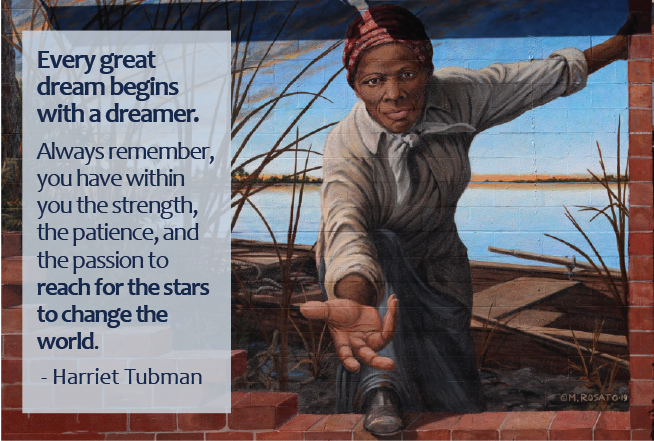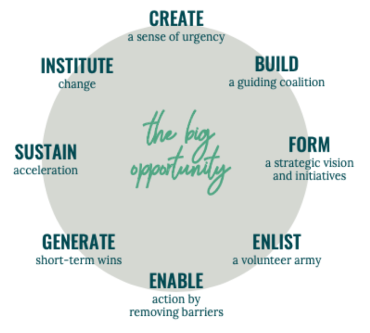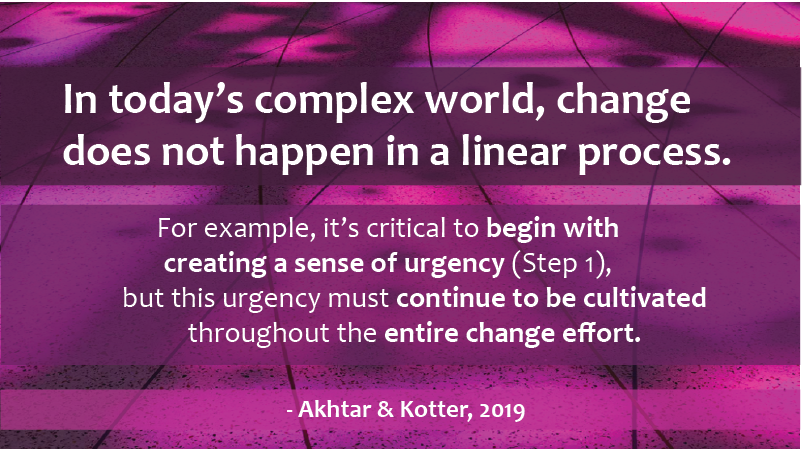Change can be scary. It removes us from our comfort zone, causes us to reflect on our practices, and makes us see through a different lens. However, change is usually frightening for just a little while, then we get more accustomed to rethinking and viewing the change as an opportunity rather than an obstacle. We need to harness our fears, prepare ourselves, and be open to the new opportunities as they arise.
Change in education must be focused on the needs of all students, not the needs of the adults. These changes are based on data, best practices, and a vision of how different the environment will look as we move out of COVID-19 restrictions into a world that we can recreate.
Creating a vision for change is the key to the success. Collaborating with our peers, communities, and experts will drive us to a better place where inclusion is the norm, and student success is measured in many ways, some which may be unique to each individual.
Embrace the change and seize the opportunities as they arise.


We all want change, but...
Have you ever noticed how much easier it is to integrate a new staff member into existing systems and culture than it is to ask existing staff to change? You may have experienced it from both perspectives! Asking existing staff to change is asking them to step from the known to the unknown. It requires learning new skills, new systems, and adopting new beliefs.
As schools across our state and the country address inclusion initiatives, existing staff are being asked to change their practices, systems, and culture. Inclusion is a worthwhile initiative for its potential impact on student performance and outcomes, but certainly qualifies as a major change process by anyone’s standards. So, while many staff may want change, many may not want to change – that is where it gets personal.
Given that many change efforts are not successful, what can be done to guard against a change effort that only has lukewarm results, or at worst, is an abject failure? What steps need to be taken to give our inclusion transformation initiative its best chance for success?
Kotter & Akhtar (2019), in Charting the Course - The Path to Transformation in Education, identify eight “critical success strategies” used by leaders who successfully transformed their companies. They believe that these strategies can transform education as well.

The first three steps in Kotter & Akhtar’s research focus on creating conditions for change, the next three on engaging and enabling the organization, and the last two on implementing and sustaining the transformation. Short descriptions of each step are provided below, adapted from Kotter’s work.

- Create a Sense of Urgency around a “Big Opportunity”: Create a compelling vision of why transformation is needed and what can be possible. This will focus others on the need for change with a clear statement that articulates why it is important to act – and act now.
- Build and Maintain a Guiding Coalition: A diverse cross-section of individuals is needed to help guide, coordinate, and communicate the sense of urgency of the initiatives that energize volunteers.
- Form a Strategic Vision and Initiatives: Describe what will be different when the vision is successfully attained and create the actions to support the greater vision.
- Communicate the vision to create buy-in and enlist a volunteer army: If change is to occur, many people must believe in the opportunity and the urgency to act to make it happen.
- Enable Action by Removing Barriers: Ensure there is a clear path where barriers can be dealt with quickly so the efforts can be focused on action and successes.
- Generate and Celebrate Short-term Wins: The path to change can be long. Sustaining energy and urgency takes focus and effort. The small wins indicate progress, continue the momentum, and invites the skeptics to join the journey.
- Sustain Acceleration: Allow progress to build until the opportunity is fully realized. Don’t declare victory too soon.
- Institutionalize Change into the Culture: Change is sustainable when it becomes embedded into the culture.
Reference: Akhtar, V.L. & Kotter, J. P. (2019) Charting the Course - The Path to Transformation in Education. Seattle: WA: Kotter

2021 Events
- IPP events are live-captioned and ASL-interpreted.
- Teams of special education and CTE instructors are encouraged to attend together.
- To access materials from previous events, visit the IPP Resources page.
Designing the Change
April 22, 2021; 3-4:30 p.m. PT
Designing the Change is the culminating seminar of the 2020-21 CCTS Inclusionary Practices Project, focusing on increasing inclusionary practices in general education and partnerships between Special Education and CTE classrooms.
Guided by a panel of professionals in the field, participants in this seminar will work through the Managing Complex Change process and design a plan to implement increased inclusionary practices. Wherever you are on your inclusionary practices journey, we hope you will join us!
Participation in previous IPP seminars is not a requirement to attend. For your reference, presentation materials from Seminar 1: Catching the Vision, and Seminar 2: Voices from the Field, are available on the CCTS Inclusionary Practices Resources page.
Planning for Next Steps
May 20, 2021; 3-4 p.m. PT
With this year ending and the beginning of next year in sight, what is your plan to increase inclusive efforts in your classroom, your school, your district? How will you develop, or enhance a culture of inclusion? What structures need to be put into place? What skills need to be developed? Is there a practice you want to implement? Join us for an informal conversation to share your strategies and learn from the best practices of other educators.
Register for IPP Third Thursday on 05/20/2021 - Planning for Next Steps
Past Training Materials and Recordings
Slide decks and captioned recordings from CCTS trainings are available online under Inclusionary Practices Resources. Topics include:
- Accommodations 101
- Aligning High School and Beyond Plans and IEPs
- CTE and Special Education Partnerships
- Effective Collaboration
- Finding Your CTE Data
- T-Folio 101+
- ...and more!
Don't miss the latest CCTS IPP updates!
